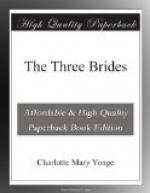“You did it on purpose,” she said, laughing at her own start.
“No, indeed, I did not.”
“And is it quite out now?”
“Yes; when the Backsworth engines and the soldiers came up, it was like the Prussians at Waterloo.”
“Oh, then it was done,” said Rosamond. “Take care! my grandfather was in the Light Division.”
“And my uncle in the Guards,” said the curate. But before the Waterloo controversy could be pursued, four or five figures on horseback came round the knoll, and Raymond and Julius sprang off their horses, introducing the three officers who followed their example.
One was Rosamond’s old acquaintance, the Colonel, a friend of her father; but she had little attention to spare for them till she had surveyed her husband, who looked nothing worse than exceedingly dusty, and at fault without his spectacles.
Inquiries were made for Frank and Charlie. They were walking home. They had worked gallantly. The flames were extinguished, but the engines must go on playing on them for some time longer. No lives lost, and very few casualties, but the paper-mills were entirely destroyed, and about twenty tenements, so that great distress was to be apprehended.
Such intelligence was being communicated as the party stood together in a group, when there was a light tinkling of bells, and two ladies in a light open carriage, drawn by two spirited ponies, dashed round the knoll; and at the moment something must have gone wrong with them, for there was a start, a pull, a call of “Raymond! Raymond!”
Throwing his bridle to Herbert Bowater, he sprang to the horses’ heads.
“Mr. Poynsett! Thank you! I beg your pardon,” said the lady, recovering herself; and Rosamond instantly perceived that she must be Lady Tyrrell, for she was young-looking, very handsome, and in slight mourning; and her companion was Miss Vivian. Julius, holding his surviving glass to his eye, likewise stepped forward. “Thank you, it was so stupid,” the lady ran on. “Is not there something wrong with the traces? I don’t know how they got themselves harnessed, but there was no keeping at home.”
“I think all is right,” said Raymond, gravely, making the examination over to a servant. “Let me introduce my wife, Lady Tyrrell.”
The lady held out her hand. “I hope we shall be excellent neighbours.—My sister.—You remember little Lena,” she added to the brothers. “She stole a march on us, I find. I heard of your encounter on Friday. It was too bad of you not to come in and let us send you home; I hope you did not get very wet, Lady Rosamond.— Ah! Mr. Strangeways, I did not know you were there,” she proceeded, as the youngest of the officers accosted her; “come over and see us. You’re better provided now; but come to luncheon any day. I am sure to be at home at half-past one; and I want so much to hear of your mother and sisters.” And with a universal bow and smile she nourished her whip, her ponies jangled their bells, and the ladies vanished.




